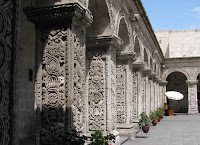 We arrived here, La Posada del Virrey, December 4th after one night at the Hotel Bolivar, where there was a money snafu with the night attendant not recording—and then denying—that we paid. El dueno (owner), let us go, but it wasn't the best intro to Peru.
We arrived here, La Posada del Virrey, December 4th after one night at the Hotel Bolivar, where there was a money snafu with the night attendant not recording—and then denying—that we paid. El dueno (owner), let us go, but it wasn't the best intro to Peru. Here, at La Posada del Virrey, we are paying about 1/3rd what we paid at Bolivar. S/25 per night ($9.10), and there is a kitchen facility (facility in that it is the bare minimum with a small sink, little counter space, a two-burner hot plate in a room measuring 2x2 meters. Needless to say the refrigerator is in another location: in the hallway, outside of our room).

So when there are a number of renters who choose to cook, it is too small to accommodate the hopeful chefs: breakfast and dinner are accomplished in shifts. What's really interesting is that the owner, Maria, doesn't seem to have her own kitchen. She too queues up for a gastronomical exercise—even though this evening she was a little pushy to get her place.
Our room is the usual non-descript two-bed job, except that one of the beds approaches full size, so that the two of us squeeze in. Of course, being 1.92 meters, I stick out the bottom if laying straight-out. But I've been there before, and, no doubt, will be again. The room is 4x5 meters, has 3
 windows that measure 1.5 meters by about the same. Both doors are half textured glass. The only light fixture is in the middle of the ceiling, but it is a compact fluorescent lamp (bonus!). We do have a balcony, which overlooks a pedestrian passageway below, high-walled back yards, rooftops, and in the distance, neighborhood volcanoes El Misti (5822 meters) and Chachani (6075 meters).
windows that measure 1.5 meters by about the same. Both doors are half textured glass. The only light fixture is in the middle of the ceiling, but it is a compact fluorescent lamp (bonus!). We do have a balcony, which overlooks a pedestrian passageway below, high-walled back yards, rooftops, and in the distance, neighborhood volcanoes El Misti (5822 meters) and Chachani (6075 meters).On a neighboring 4x7 meter rooftop, a man keeps chickens. During the day they have the run of the place. At night, he puts them in wood-slat compartments, like a small 3-story apartment house. The two roosters are generally quiet during the day, but at night they crow a bit, and at 5 am are on full-throat throttle. 
Apart from our balcony, there is the red brick rooftop terrace with potted plants, mostly geraniums, and assorted tables and gathering places, some with canopy or umbrella. On the first floor, there is an enclosed courtyard with some more interesting plants and ferns. The walls are painted mostly yellow and red, but half of the first floor courtyard is baby blue with bright red trim, giving a rather cheery or clown-like appearance. The entire place only has 7 or 8 units to rent. Two of the rooms may have private baths; otherwise, there are 2 showers for the rest of us. Overall, the place could use some repair work: the largest mirror is literally taped up on the top half, and one of its bottom support brackets is supporting only a small broken piece of the mirror. One toilet runs if not eternall y manipulated, and a valve to one of the showers leaks.
y manipulated, and a valve to one of the showers leaks.
 But overall, Posada del Virrey is more on the comfortable side than not. And, as Kirsten just reminded me, it has hot water 24/7! Unless, of course, the water is off in Arequipa. It also has a computer with internet to share. Maria is more than happy to arrange trips to Canyon del Colca.
But overall, Posada del Virrey is more on the comfortable side than not. And, as Kirsten just reminded me, it has hot water 24/7! Unless, of course, the water is off in Arequipa. It also has a computer with internet to share. Maria is more than happy to arrange trips to Canyon del Colca.




